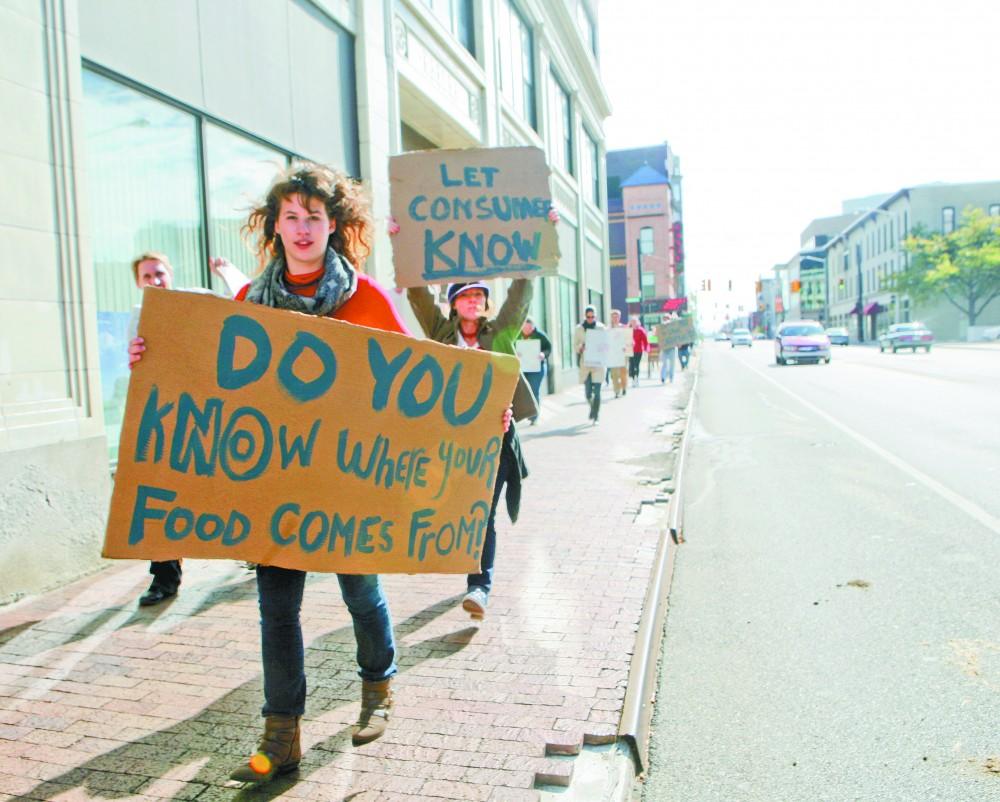MILLIONS AGAINST MONSANTO

GVL / Anya Zentmeyer Gwen Gell, a member of the Student Environmental Coalition, created the “Millions Against Monsontos March” in Grand Rapids
Oct 17, 2011
Grand Valley State University’s Student Environmental Coalition held a march on the streets of downtown Grand Rapids Sunday to protest the use of genetically modified organisms (GMOs) by Monsanto, the world’s largest seed company.
About 40 to 45 people marched from GVSU’s Pew Campus to Grand Rapids City Hall during the March Against Monsanto, which is a part of a larger national movement against the seed company called Millions Against Monsanto.
“Monsanto claims to be a sustainable company, yet their practices paint an uglier picture,” said Vince Panozzo, president of the SEC. “They continue to destroy bio-diversity and ruin the lives of countless farmers. This march is also to show solidarity with everybody who is affected by this — farmers, families, children, students, animals, those with adverse health problems, environmentalists, animal-loving people — really everybody. Because everybody is affected by it. Everybody from professors to students, from farmers at the farmer’s market to those who are Occupy-ing Grand Rapids. We definitely have strong support for this event.”
According to the World Health Organization, GMOs are defined as “organisms in which the genetic material (DNA) has been altered in a way that does not occur naturally.” GMOs are cheaper to produce, leading to lower food costs, but opponents of GMOs have criticized problems in the production of GMOs and the lack of legal regulation for GMOs in food and food labels.
The three main issues are the cross-contamination of allergenic foods, the transfer of antibiotic resistant genes and the movement of genes from genetically modified plants into the conventional crops, a process known as outcrossing.
Though Millions Against Monsanto is a nationwide effort, SEC member Gwen Gell spearheaded the process of bringing the initiative to Grand Rapids in hopes of pressuring Congress to pass a bill that will require by law that any food which may contain GMOs be labeled.
“I just saw it as an opportunity for people to come out and give awareness to Grand Rapids about our food policy and how our food system works as far as the monopoly with Monsanto, and then also with about how our food really isn’t labeled,” Gell said. “You know, microwaves might say ‘Made in Taiwan’ and we know where that comes from and we know what’s in it, but as far as food goes, not really. We don’t really know if the corn we eat comes from a genetically modified organism or the meats that we get from the grocery store — they’re not labeled and it doesn’t say if it’s from a CAFO farm, a Confined Animal Feeding Operation.”
Because GMOs are a relatively new development in food, there is no definitive information on whether GMOs are safe or harmful, but at least 19 recent studies have linked GMO consumption to organ disruption.
Since the protest aimed to draw attention to the monopoly that large corporations can have over production and money, Gell and Panozzo said it was the perfect way to show solidarity with the ongoing Occupy Grand Rapids movement, an extension of the larger Occupy Wall Street efforts taking place across the globe.
“We’re here for the same idea, it’s all about not letting corporations rule things, and the power they have, and how much money they have, and what they’re able to do with that money is not right,” Panozzo said. “And with Monsanto, they have so much control over our food, and they have so much money to ensure their advantage.”
Gell and Panozzo said raising awareness about Monsanto is more than just an environmental issue, it’s a human rights issue.
“It’s all about what we eat and what we drink, and so that’s the core value of who we are — you really are what we eat,” he said. “So, if you put healthy stuff in you, you’re going to be good and healthy and vice versa. I think the fact that Monsanto has so much control over so much of our food, it’s scary that one company can have such a monopoly over something. And it’s food, and not just other services, and you need food to survive. It’s a basic right, and it’s something they shouldn’t have the power to control so much.”
Though it’s the first time the SEC held the protest, members hope to do it again next year with a bigger turnout since they will have more time to organize.
“I think that it’s really important students know about this, because we’re really good at relaying information and questioning things and researching whether it’s for or against Monsanto, for or against labeling things,” Gell said. “I think it’s really important for us to question.”
>>>
Foods most likely to contain GMOs
Fresh corn
Fresh papaya
Cornbread mix
Corn meal
Soy flour
Veggie sausages
Tortilla chips
Processed foods
Foods with high-fructose corn syrup
Puffed corn snacks
Meatballs, burgers and soy protein
Soy-based protein drinks and powders
Foods least likely to contain GMOs
Anything labeled GMO-free
Organic food
Roma tomatoes
Candy or soda with fruit or natural sweeteners
Potatoes
Non-processed food
Popcorn
Information from the NW Resistance Against Genetic Engineering

























